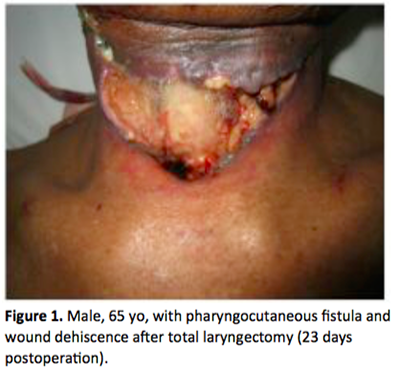Pectoralis Major Musculocutaneous Flap and Splitthickness Skin Graft for The Reconstruction of Pharyngocutaneous Fistula After Total Laryngeal Resection
DOI:
https://doi.org/10.14228/jpr.v1i4.82Abstract
Background: Pharyngocutaneous fistula (PCF) is the most frequent complication in the early postoperative period after total laryngectomy. Most PCF respond well to conservative management, but when it fails and the fistula persists surgical closure in indicated. Patients and Methods: Sixty-five year-old male was consulted to our division following total laryngectomy by the Ear Nose Throat surgeons, with wound dehiscence and pharyngocutaneous fistula. We performed a pectoralis major musculocutaneous flap (PMMCF) to close the fistula after a failed conservative management. The skin island of PMMCF was used as an inner lining to close the laryngeal fistula, the exteriorized muscle part of the "ap was then covered by skin graft.
Results: PMMCF is a technically simple and reliable distant musculocutaneous pedicled flap to cover defect on the neck area. The skin island of the flap provided an adequate air-thight cover and successfully closed the laryngeal fistula.
Summary: PCF is a problematic complication resulting from the resection of head and neck tumor. Early diagnosis and proper multidisciplinary management is required to prevent further morbidity. PMMCF is a simple, easy to perform and reliable option for closure of PCF.

Downloads
Published
Issue
Section
License

This work is licensed under a Creative Commons Attribution-NonCommercial-NoDerivatives 4.0 International License.
Authors retain the copyright of the article and grant Jurnal Plastik Rekonstruksi the right of first publication with the work simultaneously licensed under a Creative Commons Attribution License. Articles opting for open access will be immediately available and permanently free for everyone to read, download and share from the time of publication. All open access articles are published under the terms of the Creative Commons Attribution-Non-commercial-NoDerivatives (CC BY-NC-ND) which allows readers to disseminate and reuse the article, as well as share and reuse of the scientific material. It does not permit commercial exploitation or the creation of derivative works without specific permission.













